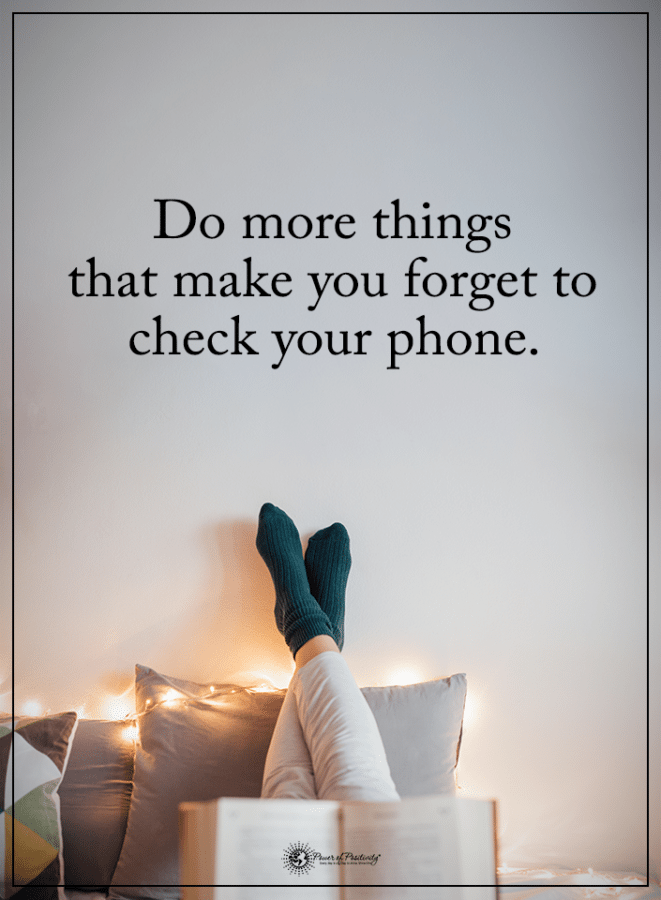What’s the first thing you reach for when you wake up in the morning? If you’re like most Americans, you’ve no doubt grabbed your phone to check social media and any emails or messages you’ve received. Do you struggle to put down your phone and connect with the people in front of you?
It may be harder to leave your phone and be present in the moment than you think. People are addicted to their cell phones. These tiny devices have replaced alarm clocks, radios, televisions, and even computers.
You can pay your bills, grocery shop, talk with friends, video chat, text, and even work from the convenience of this little handheld device. Sadly, your cell phone can become a terrible addiction–like drugs or alcohol.
Signs It’s Time to Put Down Your Phone
Nomophobia is an addiction to a cell phone. Indeed, the condition represents a real problem. The journal Addictions claims that more than 84 percent of the population can’t give up their phone for even one day.
Here are some signs that you’ve become addicted to your cell. It’s time to put down your phone and start living in the present.
1. You’re Spending Too Much Time Connected
Under the settings function of your phone, you can see how long you’ve been online. If you’re spending hours on the phone and missing out on vital opportunities to connect with your family, you’re hurting your relationships. Additionally, when you put down your phone for a bit, you will have time to do all those things you keep saying there’s no time to do.
2. You Panic if You Leave Home Without It
Outside of the apparent need to have a phone while being on life’s busy roadways, some people panic if they leave forget it. They worry about calls they’ve missed, emails, and any text messages that might come in. Some folks are so attached to their cell that they would drive an hour back home and be late for work to get this beloved electronic.
3. Put Down Your Phone if You Check Email and Messages Every Few Minutes
It’s not bad enough that you must have that phone glued to your side every minute of every day, but you also check it constantly. If you counted how many times you checked your notifications in a day, you know it would be in the hundreds. You’re so afraid of missing something that you’ve developed an obsessive-compulsive habit of checking and rechecking your device.
4. You Avoid Cell Phone Restricted Places
If you go to church, business meetings, or dinner with executives, you can’t pull your phone out and check up on things. However, you try to restrict these occasions because you don’t want to be that long without your cell. In fact, you would go to the restroom a few times and fake a sickness if it meant checking your phone.
Heaven forbid your neighbor posts a new story on their social media wall, and you miss it. It’s apparent to you and everyone around you that you have a cell phone addiction.
5. People Complain About Your Cell Phone Addiction
Being mindful means listening to your spouse and children talk about their day, and you take it all in. However, your family often tells you that you need to put down your phone and be more present. Sure, you’re sitting at the table and eating with them, but you’re scrolling through Facebook or TikTok while you do it.
Your mind is 100 miles away, and it’s beginning to take a toll on your relationships. Things are so bad that your spouse must ask you to turn off the phone and give them your undivided attention, and you get upset when they make such demands.

6. You’ve Lost Interest in Hobbies and Activities
The cell phone has dominated your life to the point where you wouldn’t think of going bowling, fishing, or doing other activities that you once enjoyed. While you’re fishing out on the lake, you know that there’s terrible cell reception, so you avoid a once-beloved hobby due to your phone.
Part of mindfulness is noticing all those little things around you, and a lake is a perfect place to take in the splendor of Mother Nature. Can you enjoy the cool breeze, the frogs and their lily pads, or the fish jumping trying to get a bite when you’re on that phone? It’s time to put down the phone and start living and being present in the moment.
7. You Think Your Phone is Buzzing When It’s Not
When a mother has a new baby, she’s often on edge, not wanting the child to sit and cry. She will be so anxious about her new bundle of joy that she may get up to check on them several times for false alarms. She thinks the baby is crying, but her nerves make her hear things that aren’t real.
These behaviors also occur in people with a cell phone addiction. Some people have a phone but know how to keep it in perspective. If you don’t let it get out of hand, it’s a valuable tool. However, it crosses the line when you’re on edge waiting for it to ring or ding, imagining it.
According to the National Library of Medicine, some folks are more inclined to have a cell phone addiction than others. Studies have shown that those with mental health issues like depression and anxiety are more apt to be addicted. Additionally, they’ve found that impulsive and introverted people are more affected than others.
8. Put Down Your Phone if It Disrupts Your Sleep
Are you losing sleep because you stay up half the night scrolling through your phone? You tell yourself that you’ll only watch two videos on TikTok before it’s lights out, but that was three hours ago.
You’re losing precious sleep because you can’t put the phone down. How can you possibly be present at work tomorrow when you’re exhausted and lacking the rest your body needs?
9. You Need Your Phone to Calm You
When you feel stressed and anxious, do you grab your phone to try to make it better? Many folks think that they can self-soothe by playing a game or watching videos. While it’s good to find something that can calm you down, why not turn to people instead of devices?
10. You Have Neck Pain from Constant Browsing
Like most addictions, there’s always some pain that comes along with it. Your neck hurts from all the looking down, and you might even have pains in your hands, wrists, and fingers. There’s a price to pay for being on that phone so much, and the loss of mindfulness isn’t the only issue.
Alarming Facts About Cell Phone Dependency
Perhaps you’ve tried several times to give up your cell phone, but you can’t be without it no matter what you try. When you put down your phone, you can be more mindful of the things going on around you and have better relationships. Here are some alarming statistics from studies reported by Slick Text.
- Around 45 percent of parents believe their children have a cell phone addiction.
- Teachers report that more than 67 percent of their students are distracted by their phones.
- Over 22 percent of people admit that they can’t go without checking their cell phone every few minutes.
- In England, over 47 percent of the population admitted to having a cell phone addiction.
- Teenagers admit that more than 52 percent of them sit on their phones while they’re with their friends.
- Around 71 percent of the population sleeps with their phone by their bed.
- Nearly 25 percent of young adults from ages 18-to 24 have admitted they have fallen asleep with their phone in hand.
- Only ten percent of folks think about their partner or spouse when they wake up, as the other 90 percent reach for the phone.
- The National Safety Council released a report that stated that 1.6 million accidents, or around 28 percent, occur because of cell phone distractions. It’s hard to be mindful when driving and talking or texting. Due to these increases in accidents and deaths, many states are banning cell phone use while driving without a hands-free device.
Final Thoughts on Recognizing When It Is Time to Put Down Your Phone
When there’s a lack of mindfulness due to smartphone addiction, it can impact every facet of your life. If you’re on your phone, you’re not mindful, are easily distracted, can get into a car accident, and give a lackluster performance on your job. Additionally, it can hurt relationships that are important to you.
Do you feel that you’re addicted to your cell? The same treatment centers that focus on drug and alcohol recovery are now adding classes to help if you can’t put down your phone. Remember when there were payphones, and you had to get out of your car to call someone?
While you can’t reverse the hands of time, it was a simpler lifestyle with fewer hassles. Being connected 24 x 7 can bring some people much anxiety, taking away their quality of life. Do you need to be this connected, or is it taking a toll on your mental health?




















